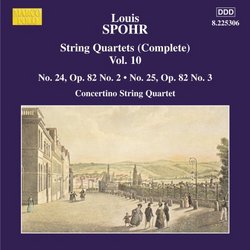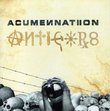| All Artists: Louis Spohr Title: Spohr: String Quartets, Vol. 10 Members Wishing: 0 Total Copies: 0 Label: Marco Polo Release Date: 4/19/2005 Genre: Classical Styles: Chamber Music, Historical Periods, Classical (c.1770-1830) Number of Discs: 1 SwapaCD Credits: 1 UPC: 636943530627 |
Search - Louis Spohr :: Spohr: String Quartets, Vol. 10
 | Louis Spohr Spohr: String Quartets, Vol. 10 Genre: Classical
|
Larger Image |
CD DetailsSimilar CDs
|
CD ReviewsMore Spohr -- and Worthy of Our Attention J Scott Morrison | Middlebury VT, USA | 05/09/2005 (4 out of 5 stars) "Spohr has been roundly criticized, and probably correctly from the view of music historical perspective, for being conservative, of not progressing in style throughout his long life -- he was born before Mozart's 'Marriage of Figaro' and lived until after the première of Wagner's 'Tristan und Isolde'! -- and yet if one listens to these Op. 82 quartets as if living in the time of their writing, 1828/29, there is nothing fustian about them. They combine classical form with the more advanced harmonic procedures extant in Schubert or Beethoven. Further, they are unfailingly tuneful, beautifully crafted, and satisfying. These are his 24th and 25th quartets -- he ultimately wrote a total of 36, the last in the 1850s -- and are generally of a piece with the rest of them. The two present quartets (Nos 2 and 3 of Op. 82) are classically balanced but different from each other in dramatic effect. They are given committed performances by the present group, the Moscow Philharmonic Concertino String Quartet. This quartet, founded in 1994, has made a specialty of performing and recording rarities of the quartet literature and this is their second CD of Spohr quartets done for Marco Polo.
Quartet No. 24 in G Major, played here with warmth and sweet tone, is probably at its most winning in its faster movements -- the main theme of the opening Allegro is particularly winsome -- but the dark Adagio balances the otherwise entirely sunny movements with its inward musing. Spohr was himself a violin virtuoso -- he also wrote at least fifteen violin concerti for himself to tour with -- and in the quartets the first violin is always primus inter pares. Violinist Yaroslav Krasnikov brings ample technique and round tone to his playing, a perfect match for the demands of Spohr's writing. Quartet No. 25 in A Minor begins with sotto voce unison writing that has a misterioso quality. The first movement, although marked Allegro, is played rather more moderato by the Quartet and that feels absolutely right because of the movement's darker tone. There is some songful writing for the cello, played soulfully by cellist Victor Kozodov. In a reversal of effect from the 24th quartet, in the 25th it is the Adagio that is the source of light and élan. It sounds like a courtly 18th-century dance. But we are back in shadowy territory with the Scherzo and then the Finale, with a long, slow and harmonically rather vague introduction before the main Allegro, continues in that vein before seemingly disappearing into thin air. This is Romantic stuff, this quartet; it is impossible to imagine that Spohr, who is so often thought to be an epigone of Haydn or Mozart, had not closely studied the late Beethoven quartets. No, this isn't on that exalted level, but it is certainly worthy of close attention by interested listeners. I find this to be one of the most rewarding of the many Spohr quartet CDs to have come our way from Marco Polo. TT=59:25 Scott Morrison" |

 Track Listings (8) - Disc #1
Track Listings (8) - Disc #1

